|
The Origin and Question of the Eyes
(poem, paintings and commentary)
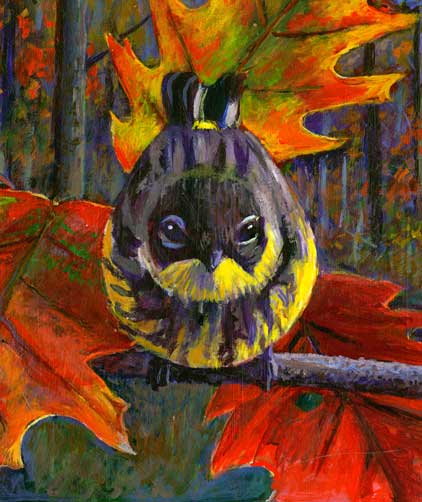
I recently wrote a poem on the "Origin of Eyes" which I present below. My poems have tended to become
more literal and based on realties of what I see and experience rather than
on imagination and high flown generalities. I no longer see myself as part of
the romantic or gnostic school of poetry that developed in the 19th century or
even of the "prophetic" gnosticism that developed out of the Beat movement. My
writing of poetry is not about longing for an imaginary beyond, an unattainable
love or some other Zen void or Sufi fiction. I use poetry as a means of
meditation of real things and beings instead. I do not train my poetic
imagination to look away from the earth, but rather, towards the earth. So
this poem on the "Origin of Eyes" is another effort to express a certain sort of
wonder about how part of the human body came to be. I had written a poem
about "Sun and Sunlight" and then "Origin of Milk" shortly after my baby was born that is a sort of
companion piece to this poem about eyes. Both poems are to some degree a
meditation on an aspect of evolution. The production of milk for babies by
mammals is certainly an amazing thing. The eye too, is incredible. How did it
come into being? It is clear that eyes were not created by a fictional deity.
Eyes originated through evolution, beginning with light sensitive cells in worms
or simple animals and developing by natural selection into complex eyes with
retinas and lenses. What an amazing thing to develop the ability to see light
and color! So here is the poem about seeing and eyes, I include some details of
paintings of mine which feature the eyes of a squirrel a a finch.
The
Origin of Eyes
Why did eyes come into being?
What cell of waters began first to tell day from night or feel warmth of
light?
What worm first the soil shunned
to learn to see sun and air?
How did the sense of looking
learn to feel that others, too, are aware?
How far from holding earth in ones hands
is holding in ones eyes
the learning of the land ?
Chomsky says that just as the eyes evolved over time
language became the organ of the mind.
Being as that might possibly be
saying “Tree” is not seeing a tree,
seeing a tree is not the same as the name.
Never mind that words are an abstract, confusing game---
the eye is not a metaphor for god
but an organ grown from earth, sun and clod:
yet the eye is not just a mechanical gland
but a way of trying to understand.
The eye is not a universal mirror
but a way beings of earth can see existence clearer.
In the eyes of birds and animals I see
the meaning of the verb ‘to be’, looking back at me.
In an otter’s eyes is the meaning of life searching for the next pond,
or a whale's eye in spring seas glancing up into a starry night.
To see is to reach into space
and share in another's being between our faces.
To learn to see is to touch a world within
that is far away.
To hold life's braided vine,
made out of rainbows,
and for a moment,
steal it from time.
|
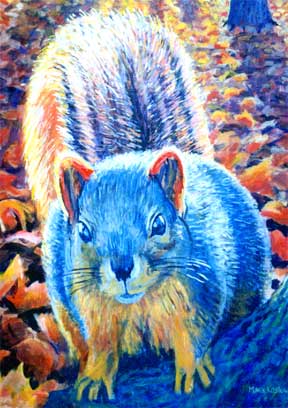
Close up of Squirrel Tail in Sunlight |
A Bitterroot Antelope in Montana was seeing
a distant fragment of my lone being.
Its eyes were dots I could hardly see
But still I could see it was looking at me.
And what else is all life about
except to see into the eye of a rainbow trout
Neither fishing or frying or cutting meat,
but instead to thrill and exult
to see a bird in a late summer moult
and gaze into its overheated eye
and catch of glimpse of its precious life:
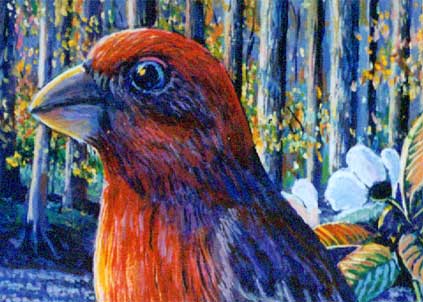
To see for a minute what it might see
and be non-human for a little while
a newt, a bull frog, a crocodile
and escape, however tenuously,
the selfishness of species, kinds
to leave the prison of the human mind---
enter into another’s being---
and see the world from their seeing.
How does the Sand Dab see the sand
or how does the Whale view land
how does the otter consider water
does the pond-building Beaver know
how it helps so many other species grow?
what comfort is a Fox’s lair
and what do Elephant’s consider fair?
The Mountain Sheep sees far below
a world safe in infinite snow
to see Manta Rays mating is a delight
no less lovely than a Whopping Crane in flight.
If I seek in the eyes of an animal or bird
a hint of the origin of life is heard
a glimmer of where life’s sweet song
ties together a braid of hidden bonds.
__________________________________
|
|
____________
The poem is composed of
pictures and aphoristic fragments. These are meant to be read almost as separate
Haiku, yet at the same time to echo each other. Perhaps the main point of the poem is this line to "enter into another’s
being---and see the world from their seeing." I was trying to say that in
the eyes of animals one can find a relation with other beings of the earth-- a
"trust of hidden bonds" was changed to "a braid of hidden bonds" to
echo the earlier line "To hold life's braided vine,
made out of rainbows", which is a visual metaphor for
"life's sweet song". Animals are different than humans, but they also
share much in common. I want to appreciate their differences as well as their
solidarity with me. Of course, the fact that I have been a vegetarian for many
years helps in this process. I find that those who still eat animals often have
difficulty forming an identity with animal's point of view. Eating animals
subtly influences how they think without their being aware of it. They might
still insist, for instance, on calling animals "creatures", "critters" or
'brutes" or other such demeaning terms. I never use the word "creature" to
describe any being. It implies a subservient relationship to a "Creator" who is
inevitably pictured as a human male. Anthropocentric or even impersonal deities
don't interest me.
I
thought about eyes often during the years I spent at Heroes Wetland. I thought
of both my own
eyes and the eyes of other beings. I thought about the meaning of seeing, light
and space. The use of the eyes by humans has had many
implications for animals and the earth. When I looked at animals and birds in
their natural homes I could see that they feared my gaze and did much to avert
their own eyes form seeing into mine. They fear being observed or watched by
humans. Indeed, human observation over the centuries has hardly been a harmless
affair. The inquiry into nature, from the point of view of animals and birds,
has been more of a bloody Inquisition than a harmless exercise in curiosity.
Though my purpose in observing nature has been not just benign but seeking to
defend nature's rights and advocate for nature's restoration, this is by no means the
case of many others of my species. Daily the lives of many species are
threatened and in
decline, due to corporate rape, hunting, exploitation, over fishing, trapping, displacement and
habitat destruction.
Science is not entirely guiltless in supplying means and
knowledge to harm or exploit non-human animals. Science, to some degree, is a
hegemony of human eyes, a human centered empire of the 'observer'. Descartes'
project of having science push back the darkness of human ignorance had as its
corollary that nature and animals were unjustly threatened and harmed. It has
been said that modern philosophy and science are "ocularcentric".
For instance, Chomsky's philosophy is ocularcentric because it is partly based
on the evolution of the eyes as a metaphor for the growth of language.
Michel Foucault speaks of the human "gaze" as a metaphor for all seeing power.
" Christ's saying "if thine ye be single" is about such a totalistic vision that
tramples all else beneath it. The Church of the 12th century which created the
Inquisition is such a totalistic institution.
I have come to question the assumption that human vision has a right to hegemony
and empire. The scientific empire of the human observer is brought into question
by my awareness of the point of view of non-human beings. Animal's eyes in some
way hold the key to limiting corporate and scientific hegemony. If we can see
into nature with both science and sympathy, there might yet be hope for us and
or animals sisters and borthers.
Animals and birds of all kinds sense human
intentions and know to fear us. While I watched animals and birds at Heroes, I
could see their fear of my eyes and felt badly about that. I felt ashamed of my
species and what we had done to animals and birds to make them so afraid. My
awareness of this increased with time. I felt more and more the need to protest
the dictatorship of the human eye.
There is no doubt that the use of human eyes as a means
of measured inquiry into nature has often resulted in horrible atrocities,
extinctions and harms, from global warming to destruction of rain forests and
plant and animal populations. But once this is understood it would be a mistake
to blame the eye itself. I used to like William Blake's saying that " I
see through the eye and not with it" since it implied he had some 'higher
vision' that mere a view to economic plunder. But now I think that Blake was
mistaken in his own way too. The narrow vision of an imaginary world is not a
good way to see either. There is no "spiritual" world that is somehow
higher than the natural world. There is no "spiritual vision" or "eye of wisdom"
, "third eye" or other such magical inventions of bygone eras. Such fictions are
images meant to magnify a certain way of perceiving advocated by some
institution or religion. Since there is no such thing as spiritual vision, there
is only the eye itself and the mind that is part of the eye, the mind and the
body not being separate in any real way. In contrast to Blake I am not
ashamed of seeing "with" the eye. My mind is not superior to nor inferior
to the eye itself. The eye itself is an amazing thing and vision is neither
owned by gnostics like Blake or those who see with mercenary eyes. True, Blake's
concern with the poor and the suffering is admirable and I love him for that.
But the eye is innocent in itself, indeed, it is a wonder.
Yes I have often felt ashamed of my human eyes in the
presence of non-human animals. But it is not my eyes exactly that I am ashamed
of. I am ashamed of how and for what purpose human eyes have been used. We
need to change how we use our senses, especially the eyes. I do not mean by this
that we need to learn to see or sense like another kind of animal. It would neither do me
or nature good if suddenly I
could smell as well as a wolf, a Bloodhound or or Vulture, or if my eyesight
were as keen as a Peregrine Falcon. The senses of every being are suitable for
how that being lives. An otter depends on musk and scent for many of its
relations to others of its kind. Humans rely less on scent, perhaps. But that
scarcely matters. Seeing is a very important sense, to both otters and humans, whatever may be the value of
the other senses.
The main thing is humans need to relearn how to see
animals and birds, nature and the world before it is too late. But what I mean
by 'seeing' is not exactly what someone with predatory or mercenary purposes has
in mind with they talk of seeing. What is clear is
that the use of human eyes as a kind of inquisitorial tool to dissect and
dominate nature has not been ultimately good for either man or nature. The
process of inquiry was too separated from a decent ethics, or a way of seeing
the world with sympathetic understanding. It is not enough to know. One must
also care.
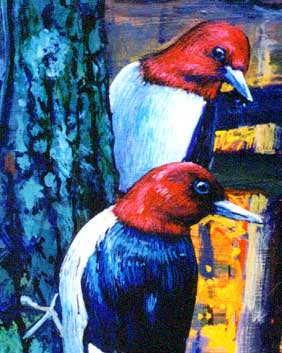 |
So, as I walked around
Heroes wetland seeing this or that bird or animal, I often felt shame for my
human eyes. I did not want to be a predator, like others of my species. I
was not there to harm anyone, on the contrary, I was concerned to understand
them and what they had to say about their lives and their rights. So at
various times I found myself trying to look with different eyes. Trying to
change the quality of my eyes form the inside, as it were. Looking with
peaceful eyes that sought to understand but not appropriate. Refusing to
look out of my eyes with any selfish need to own, possess, colonize or
appropriate, I found myself being changed by what I looked at. When I
refused the eyes of a hunter or a user, or even the eye of the behaviorist
or the detached scientist, I started seeing the most amazing things
happen before me. |
Learning to see for me has been partly an exercise in being willing to be taught
how to see. Watching animals or birds in their world is perhaps one of the best
ways to learn compassion for different beings. I do not mean watching with the
intent to kill, or watching with the intent to win a scientific award. I mean
watching with the intent to learn from animals who and what they are. I
began trying to train myself to see through animals eyes as much as I could.
The way to do this is to watch the animals and try to imagine how the world
looks form their point of view.
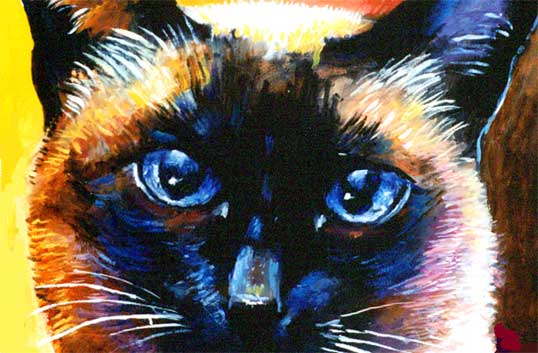
I wanted to reverse the tendency of
humans to create an all seeing, god-like point of view. I wanted to try to
see the lives of animals through their own eyes. Of course, this is not possible
in any complete sense. But with sympathy, intelligence and intuitive
identification one can approximate the lives of other species. Someone has asked
me why not study the other senses of animals as well. Of course, studying the
scent mounds of beavers, or the spraying of scent by wolves is a very
interesting. But I am an artist, and eyes are very important to me. There
is no point in setting up the senses in competition with one another.
Seeing is enhanced by smelling, touch, taste and hearing. One way to
try to overcome human centeredness is to try to look though he eyes of other
beings and the purpose of that is to try to feel what they might feel. The eyes tell the story of what they are interested in and what they
want to know, fear or love. To try to see through their eyes is a very valuable
thing to do.
For instance, I watched birds
fly through he forests at Heroes. Certain birds, like nuthatches, warblers or
grackles, could negotiate through very dense thickets and hardly touch a feather
to a branch as they flew through. The capacity of brain eye, body coordination
among birds is extraordinary. Their abilities to negotiate through space are
far greater than humans. I began to see that humans are not exceptional, not
better than other species in any generic way.
One year I saw a female Snapping Turtle going inland
from the pond to lay her eggs, and I got a good look at her eyes. She was
not really afraid of me exactly, but cautious. If I moved right, she moved
right. If I moved left, she moved left. She was protecting herself. But I found it very difficult to
see into her eyes, as I could see into various bird's eyes, or geese and deer.
Snapping Turtles spend allot of time underwater and their eyes are different
than land mammals. But I didn't think this through, and
wondered instead if the snapping turtle is rather simple minded.
This judgment came into question the following year.
One day when I was at
the pond I noticed a flipper like leg coming out of the water occasionally and
then another. I walked to the shore of the pond and looked closer and two
snappers were having a sort of mating dance or ritual a few inches under water,
Intermittently one or the other would put its leg or tail up out of the water.
They were circling and touching each other. The exact nature of this activity was
beyond me, of course. But what I learned is that my original perception that
Snappers might be simple minded was wrong. There is much more to these beings than I could see judging just by its eyes,
certainly. But clearly its eyes made it able to see its own kind very well and
to move though the water in a kind of loving dance. Looking into its eyes was
different than seeing into a mammals and birds eyes. I judged the turtle on the
basis of what I was used to with mammals. But once I recognized my mistake, I
had learned something about the world of turtles.
One of the birds that I spent allot of time studying at Heroes is Green Heron.
These small, beautiful herons are able to stay still for many minutes and to
move so slowly that their motion is undetectable to the naked eye. One year one
of these birds got used to me coming to Heroes everyday and for some days used
me as a foil to catch tadpoles or pollywogs. As I walked around the pond the
bird noticed I scared frogs and pollywogs into moving and it positioned itself
quite close to me so that as I walked by it would catch the moving pollywogs.
This enabled me to study the bird form a very close vantage point.
Looking into the birds eyes made me able to see how patient this birds can be,
and how much control it has over its body's movements. I watched the birds take
a few minutes to move two steps.
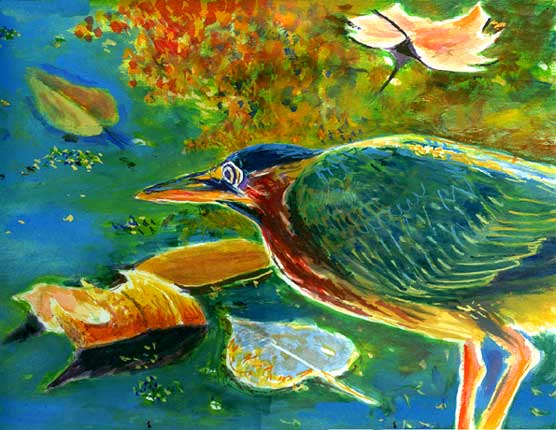
The Green Heron lost its fear of me because it saw me so
often at Heroes. The lovely Wood Ducks were a different story. They nest high in
various trees around Heroes . They are nervous and skittery. I could see their fear of me every day,
and even over the course of a few years their fear did not seem to decrease very
much, even when they saw me everyday. I suspect that this fear is due to an ingrained
fear of people due to hunting over many generations. The female Wood Ducks were
especially wary when their babies had drifted down from the trees and joined her
in the pond, where they would follow her in an amazingly tight and responsive
little group, turning at her tail in every direction she turned. The
female Wood Ducks eyes has a bright white circle around it. The males eye is the
most brilliant red imaginable.
Of all
birds I have ever seen I think perhaps the Wood Duck is one of the most
beautiful in its diverse visual designs and rainbow coloring
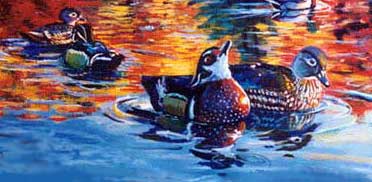
So, I have been trying for some years to change
the way I see by looking at how animals see and live. I have found that if I try hard enough, most animals will grant
me some trust, if not entire trust, if they learn my eyes mean no harm. But
then, one does not want some animals to learn to trust humans too much. Deer and
ducks are two species that are mercilessly hunted by pleasure seeking sadists.
So I often held myself back from getting too close to these animals, so that they
might retain their fear and perhaps survive longer.
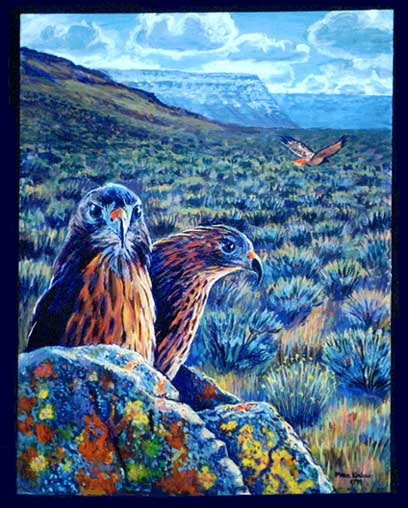
The eye is an important window to the world. Only
some human eyes are predatory. Hunters, like corporate entities, see nature as a
place for humans to take unfair advantage of other beings. One must carefully
distinguish between human killers and animals as predators. Animals kill because
they must to survive, like the hawks above, which I saw int eh Oregon Great
Basin.. Humans were not evolved as meat eaters, as is proven by
our teeth and our digestive system which is like the vegetarian gorilla and
chimp. Killing for humans is a cultural creation, like religion or corporations.
The killing off of many species and populations is the result of a culture of
piracy and plunder combined with human centeredness that derives form religious
fictions. This can all be changed. Corporations must be brought into question
and their powers dismantled and their charters withdrawn. Not all humans are lacking in remorse and
care for other kinds of beings as corporations and other institutions are. More and more people are waking up to the
destructive effects of corporatism and religion. As more and more humans look
with well meaning there is greater and greater hope for the future of the earth.
I wrote in "Nature" section of the Philosophical Drawings that
"The structure of the eye does
not signal a message of harm in itself. Indeed the eye, any eye, from that of a
cow to a fish, is a wonderful image of cells formed into a global shape that
combines sky and sun with water and light in an inverse image of the earthly
sky. I can't think of a more marvelous example of the wonder of existence the
evolution of consciousness on earth than the globe of the eye and its rainbow
relationship to the globe of the earth."
Yes, I wrote this
about a year ago and still agree with it. The eye is the shape of the earth and
the horizon. It brings the earth closer to us. Without the earth there are no
humans or animals or eyes. We are products of evolution. We owe the earth
everything. Other beings are our relations. Their eyes like our eyes were
created by ages of interaction with the earth and the sun. In a certain way the
earth is us the earth see itself through us and other beings. We are the seeing
of the earth. We need to care for all that we see. This is our world and belongs
as much to Whales and Wtters as Humans and Eagles.
I believe that real seeing is the
root of caring. Chomsky suggests in his writings that there may be an origin
of the sense of justice in the genetic makeup of organisms on earth. Certainly
children show an instinctive grasp of fairness, as do many other animals and
birds. It would seem that somehow seeing is the root and origin of caring. I
suspect that the deeper one sees into the process of the natural world the more
we will become aware of the earth having a sort of conscience. This is not to
say that nature is "moral' exactly, but rather that there nature has self
regulating abilities that Henry Thoreau referred to when he said that "in
wildness is the preservation of the world".
Close observation of nature is does not
separate one from the need to stand steadfast for the preservation of other
species, even to the point of acts of civil disobedience. Seeing is not merely
an act of indifferent scientific recording. Seeing creates empathy and
compassion. The more one knows about nature in an intimate way, the more one
comes to care for other beings, forests, estuaries or the earth itself. Seeing
ultimately is a political act because one begins to recognize how
institutions and corporate entities rape the earth without remorse or
conscience. Opposing this rape becomes the duty of anyone who has learned how to
use their eyes. Nature does not exist as a "resource' for humans. Rather, nature
is independent and autonomous and must be accorded its own rights to exist and
thrive unmolested. No one can own nature or other animals, just as no one
has the right to own humans. All patents taken out on genes and organisms
by corporations should be abolished. The animal
trade in all its forms should be stopped. No one really owns land either,
without respecting the beings that live there. One has the right to merely care
for land in a sustainable and reciprocal way.
Seeing is the beginning of understanding a world that
exists for millions of beings each one having a right to be here. Looking out
from animals eyes is the meaning of life on earth. Humans are animals, and
realizing we are all related is what will save the earth. This is what I
see when I look into animals eyes.
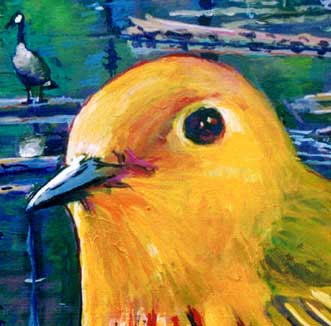



|